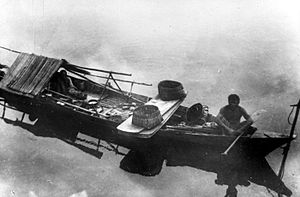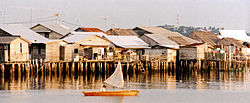Orang Laut
 An Orang Laut family living in a boat, circa 1914–1921. | |
| Total population | |
|---|---|
| 420,000 | |
| Regions with significant populations | |
| Malay Peninsula: Riau Archipelago: | |
| Languages | |
| Loncong, Orang Seletar, Malay (Malaysian, Singaporean, Indonesian) | |
| Religion | |
| Animism, Folk religion, Islam | |
| Related ethnic groups | |
| Orang Kuala, Orang Seletar, Sama-Bajau, Moken, Urak Lawoi’ people, Malay people |

The Orang Laut are several seafaring ethnic groups and tribes living around Singapore, Peninsular Malaysia and the Indonesian Riau Islands. The Orang Laut are commonly identified as the Orang Seletar from the Straits of Johor, but the term may also refer to any Malayic-speaking people living on coastal islands, including those of the Mergui Archipelago in Myanmar and Thailand, commonly known as Moken.
The population of the tribe in the 21st century is estimated to be 420,000 people.
Etymology
[edit]The Malay term orang laut literally means 'sea peoples'. The Orang Laut live and travel in their boats on the sea.[1] They made their living from fishing and collecting sea products.[2] Another Malay term for them, Orang Selat (literally 'Straits people'), was brought into European languages as Celates.
Distribution
[edit]
Broadly speaking, the term encompasses the numerous tribes and groups inhabiting the islands and estuaries in the Ria Archipelago, the Pulau Tujuh Islands, the Batam Archipelago, and the coasts and offshore islands of eastern Sumatra, the southern Malay Peninsula and Singapore.[4]
History
[edit]
Historically, the Orang Laut played major roles in Srivijaya, the Sultanate of Malacca, and the Sultanate of Johor. They patrolled the adjacent sea areas, repelling pirates, directing traders to their employers' ports and maintaining those ports' dominance in the area[2][5] In return, the ruler gave the Orang Laut leaders prestigious titles and gifts.[2] The earliest description of the Orang Laut may have been by the 14th century Chinese traveler Wang Dayuan who described the inhabitants of Temasek (present day Singapore) in his work Daoyi Zhilüe.[6]
Popular culture
[edit]
In the story The Disturber of Traffic by Rudyard Kipling, a character called Fenwick misrenders the Orang Laut as "Orange-Lord" and the narrator character corrects him that they are the "Orang-Laut".
See also
[edit]- Piracy in the Strait of Malacca
- Orang Laut in Singapore
- Urak Lawoi’ people
- Sampan panjang, Orang Laut racing boat
- Loncong language
References
[edit]- ^ Adriaan J. Barnouw (February 1946). "Cross Currents of Culture in Indonesia". The Far Eastern Quarterly. 5 (2). The Far Eastern Quarterly, Vol. 5, No. 2: 143–151. doi:10.2307/2049739. JSTOR 2049739.
- ^ a b c Barbara Watson Andaya. Report of Three Residents of Jambi about the Threat of Johorese War Vessels in the Batang Hari River, 11 September 1714. Jakarta : Arsip Nasional Republik Indonesia. 2013 https://sejarah-nusantara.anri.go.id/media/dasadefined/HartaKarunArticles/HK010/Doc_10_Eng.pdf
- ^ David E. Sopher (1965). "The Sea Nomads: A Study Based on the Literature of the Maritime Boat People of Southeast Asia". Memoirs of the National Museum. 5: 389–403. doi:10.2307/2051635. JSTOR 2051635.
- ^ "The Malay Peninsula and Archipelago". Bartleby. Archived from the original on 12 March 2007. Retrieved 12 March 2007.
- ^ Mary Somers Heidhues. Southeast Asia: A Concise History. London: Hudson and Thames, 2000. Page 27
- ^ Paul Wheatley (1961). The Golden Khersonese: Studies in the Historical Geography of the Malay Peninsula before A.D. 1500. Kuala Lumpur: University of Malaya Press. pp. 82–83. OCLC 504030596.
External links
[edit]- Pirates of the East
- Where the spirits roam
- Riau in Transition
- 1400s - The Orang Laut Warriors - a short documentary about the Orang Laut in the 15th - 17th century, produced for the Singapore Bicentennial in 2019.
| Sumatra | |
|---|---|
| Java | |
| Kalimantan | |
| Sulawesi | |
| Papua | |
| Lesser Sunda Islands | |
| Maluku Islands | |
| Non-indigenous | |
| Bumiputera |
| ||||||||||||||||
|---|---|---|---|---|---|---|---|---|---|---|---|---|---|---|---|---|---|
| Chinese (list) |
| ||||||||||||||||
| Indian (list) |
| ||||||||||||||||
| Mixed ancestry (non-Peranakan) | |||||||||||||||||
| Foreign ethnicities /expatriates | |||||||||||||||||
Text is available under the CC BY-SA 4.0 license; additional terms may apply.
Images, videos and audio are available under their respective licenses.
